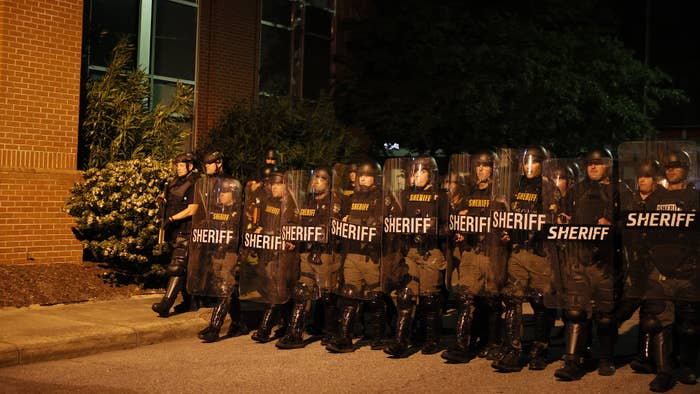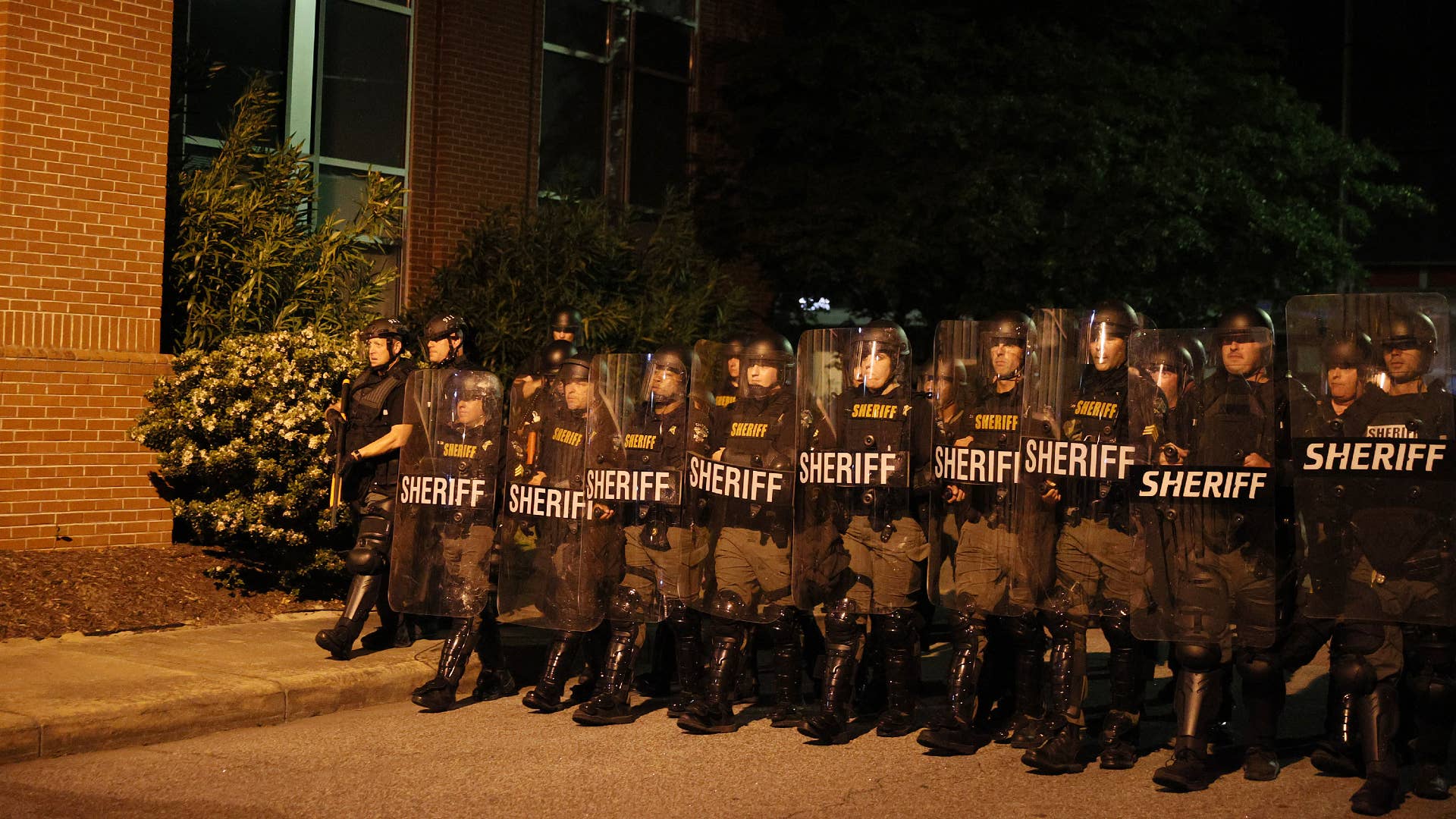
Despite the fact that the right to gather with fellow citizens in protest is a key element of a functional democracy, as well as a crucial facet of the First Amendment, many Republican lawmakers have ramped up anti-protest legislation efforts in recent months.
The multi-state push comes following a year of particularly urgent nationwide protests against police brutality, including extended demonstrations in response to the May 2020 murder of George Floyd. Floyd, a 46-year-old Black man, was killed in Minneapolis during an arrest at the hands of white police officer Derek Chauvin. Nearly one year later, Chauvin was found guilty of second-degree murder, third-degree murder, and second-degree manslaughter.
The issue of protests, however, reentered the Chauvin conviction news cycle after a number of conservative figures argued that a juror’s participation in the 2020 March on Washington while wearing a Black Lives Matter t-shirt could be used as part of an appeal campaign.
Speaking more broadly, Republican leaders seem hell-bent on demonizing the act of protest at every turn, including via some potentially detrimental legislative efforts.
Below, we take a look at where things stand across the U.S. with regards to protest-targeting legislation.
As of late April, as detailed in a New York Times report from Reid J. Epstein and Patricia Mazzei, the 2021 legislative session had seen Republican lawmakers in 34 states introducing 81 anti-protest bills. According to Elly Page, who’s a senior legal adviser at the International Center for Not-for-Profit Law (ICNL), that’s more than double the amount of similar proposals for any previous year.
Among the pending initiatives are those that would impose new criminal penalties for protesters on pipeline property, those that expand the definition of “riot,” those that would increase penalties for protests that block traffic, and much more. Some, deceptively, are touted as “anti-riot” pieces of legislation when they are in fact widely interpreted to represent a push for greater punishment for those who participate in any kind of protest.
“The right to protest is critical to a functioning democracy, as it allows the people to hold government accountable,” a rep for the American Civil Liberties Union said earlier this year when addressing the rise in anti-protest legislation. “Over the last four years, we have seen similar anti-protest bills to the ones legislators are now trying to rebrand. These are overactions and will inevitably be used against marginalized communities.”
Even more alarming is a recent bill signed into law in Oklahoma that states “a motor vehicle operator who unintentionally causes injury or death to an individual shall not be criminally or civilly liable” if the injury or death occurs while “fleeing from a riot.” Similarly worded legislative pushes have also been seen in Florida and Iowa.
States that currently have pending legislation aimed at restricting the right to peaceful assembly—per a law tracker from ICNL—include Alabama, Arizona, Arkansas, Connecticut, Georgia, Illinois, Indiana, Iowa, Maryland, Minnesota, Missouri, Montana, Nebraska, Nevada, New Hampshire, New Jersey, New York, North Carolina, Ohio, Oklahoma, Oregon, Rhode Island, South Carolina, Tennessee, Texas, Washington, and Wisconsin.
Anti-protest bills have been recently enacted (i.e. signed in 2021) in Alabama, Arkansas, Florida, Kansas, Ohio, and Oklahoma.
ICNL’s protest law tracker has been keeping tabs on anti-protest pushes since November 2016. Since then, 45 states have considered a total of 222 protest-targeting bills.
Notably, when Florida Governor Ron DeSantis and other leading Republicans rallied behind the signing of the state’s so-called “riot bill” in April, there were no mentions of the fatal Capitol riot in January. Instead, DeSantis went out of his way to criticize the Minnesota attorney general just as closing arguments were taking place in Chauvin’s murder trial.
“I don’t know what’s going to happen, but I can tell you that case was bungled by the attorney general there in Minnesota,” DeSantis said. “They didn’t handle it properly, so there may be some people disappointed.”
Brevard County Sheriff Wayne Ivey, meanwhile, touted the bill as the latest example of DeSantis’ support of law enforcement.
“From day one, Governor DeSantis has stood shoulder to shoulder with law enforcement to protect our citizens and this bill is another perfect example of his commitment to make certain that Florida is the safest state in the country,” Ivey said.
Among other things, the Florida bill in question expands the legal definition of “riot” to include any group of three or more whose intentions cause what lawmakers describe as “imminent danger” of property damage or personal injury. As ICNL points out, this expanded definition does not require a group’s conduct to actually be disorderly or violent. Instead, the new law says a so-called “riot” of 25 or more people is automatically labeled an “aggravated riot,” which now marks a second-degree felony offense in the state.
Other Republican leaders have made similar remarks about protest-targeting legislation. Rep. Kevin West of Oklahoma, for example, touted the state’s motorist immunity legislation as an “important protection” for families.
“When fleeing an unlawful riot, they should not face threat of prosecution for trying to protect themselves, their families or their property,” West, a co-sponsor of the state’s bill, said in April.
DeSantis, meanwhile, has been sued over his so-called “anti-riot” push.
In March, just as the Florida proposal was headed for a House floor debate, Rep. Kevin Chambliss pointedly criticized the move as “the scariest piece of legislation that I have seen in my life.”
And Chambliss is far from alone. After Senate Republicans passed the Florida bill in April, several Senate Democratic Caucus members—per the Miami Herald—held a joint press conference during which they wore black shirts intended to represent their collective “mourning of the death of the First Amendment.”
Rep. Mary Moore of Alabama, meanwhile, explained back in March that a similar bill in that state is “very similar” to the brutality forced on those who marched in the Children’s Crusade in Birmingham in 1963.
“Bull Connor turned the hoses on us,” Moore, a Birmingham-based lawmaker who previously served on the city’s school board, said on the Alabama Politics This Week podcast. “They had the dogs out there. I’ll never forget those dogs—they all had the same name and it started with N. But their goal then was to arrest as many people as possible, put them in jail and they’d lose their jobs and be unable to protest again. That was the plan.”
In April, the Oklahoma leader of the Young Democrats of America—Joshua Harris-Till—announced that he had filed paperwork to start the veto referendum process in response to the state’s aforementioned bill that gives motorists immunity. According to Harris-Till, this effort represents “a community-led coalition.”
Meanwhile, many constitutional rights-focused groups—including the ACLU—have repeatedly condemned anti-protest legislation through a variety of awareness campaigns.

